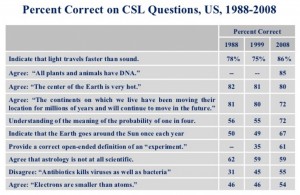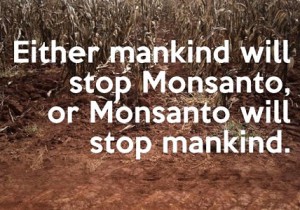Dec
29
2015
 Yesterday I wrote about types of misinformation online. I left one out – skeptics or scientists creating false information to show how easy it is for people (or specifically the press or journal editors) to be fooled.
Yesterday I wrote about types of misinformation online. I left one out – skeptics or scientists creating false information to show how easy it is for people (or specifically the press or journal editors) to be fooled.
I have never personally done this for several reasons (as tempting as it may be): I think it’s important to protect my integrity as an honest broker of information and opinion, and that would be sullied by a deliberate hoax, no matter what my intentions. I also worry about adding to the pile of misinformation out there, while the lesson would be largely lost. Also, it can be a lose-lose situation. If you pull it off well, it can backfire. If you don’t pull it off well, you look silly.
Case in point – in 2012 a Portugese-language blog created the false conspiracy theory that Avril Lavigne killed herself after her first album, and was replace by a doppleganger who took over her career. However, the replacement dropped subtle clues in lyrics and elsewhere, revealing the conspiracy.
Continue Reading »
Dec
28
2015
 Diana Rusk writing for BBC news has a good article about fake photos and videos that were spread in 2015. It is a sobering reminder of how much fake, misleading, and deliberately fraudulent information there is out there.
Diana Rusk writing for BBC news has a good article about fake photos and videos that were spread in 2015. It is a sobering reminder of how much fake, misleading, and deliberately fraudulent information there is out there.
As I have often pointed out, the internet is a fantastic tool for communication, but is also a double-edge sword. If even a tiny percentage of the online public are generating false information, for whatever reason, that will create a steady stream of misinformation. We will never be rid of it.
Think about this, estimates are that about 1% of the population are psychopaths. That is 3 million psychopaths in the US alone. Some are in prison, but many are in the general population and have access to the internet. Online they can wreak havoc with impunity. In fact there is some preliminary information that there is a huge overlap between being an internet troll and a psychopath. Continue Reading »
Dec
22
2015
 A new study published in Nature Neuroscience explores genes that correlate with intelligence in healthy individuals as well as those with epilepsy and cognitive disorders. They looked at the brains of patients undergoing surgery for epilepsy, which means that a sample of their brain tissue was available. This allowed them to find which genes were highly expressed in brain tissue.
A new study published in Nature Neuroscience explores genes that correlate with intelligence in healthy individuals as well as those with epilepsy and cognitive disorders. They looked at the brains of patients undergoing surgery for epilepsy, which means that a sample of their brain tissue was available. This allowed them to find which genes were highly expressed in brain tissue.
They then combined this data with other data sets including genetic analysis and IQ testing on healthy individuals and those with developmental disorders. They analysed thousands of genes to find those that correlate with differences in IQ.
They found that there are two sets of genes, which they are calling M1 and M3, that highly correlate with intelligence. M3 contains 150 genes that are tightly developmentally regulated. Keep in mind these are genes that they know are highly expressed in the brain.
Continue Reading »
Dec
21
2015
 Yeah, I know. Astrology. That is seriously old school. What is amazing is that there are still people who vehemently defend this ancient superstition. It is a window into the flaws and biases of the human brain.
Yeah, I know. Astrology. That is seriously old school. What is amazing is that there are still people who vehemently defend this ancient superstition. It is a window into the flaws and biases of the human brain.
In a way the exact topic of this discussion does not matter. By studying any scientific discipline in detail one can learn many generalizable lessons about science itself, and even knowledge itself. Similarly, by studying any one pseudoscience one can learn many generic lessons about the nature of pseudoscience – although, it is easier to see these lessons when one studies at least several pseudosciences and sees the commonality among them.
Having written hundreds of articles about different pseudosciences, I often feel I could just click in specific names to general arguments. The details, however, do matter as they provide specific examples that aid in understanding the underlying principles and how to apply them. We tend to compartmentalize knowledge, and so seeing many different examples really does drive the concept home and help apply it broadly – especially to our own thinking. Continue Reading »
Dec
18
2015
 James Tracy taught Culture of Conspiracy at Florida Atlantic University, and yet, amazingly, is himself a conspiracy theorist. This is sort of like allowing a creationist to teach evolutionary theory.
James Tracy taught Culture of Conspiracy at Florida Atlantic University, and yet, amazingly, is himself a conspiracy theorist. This is sort of like allowing a creationist to teach evolutionary theory.
I think this analogy is apt because in order to properly teach the culture of conspiracy, one must understand how conspiracy thinking works, and especially where it goes horribly wrong. By all accounts, Tracy does not understand this – he is a victim of it.
As a reminder, in December 2012 a disturbed young man decided it would be a good idea to go into an elementary school and slaughter young children. He killed his mother, 20 children, 6 teachers, and then himself. This was a horrific event for the families, for the town, and for our country. This was every parent’s worst nightmare.
Continue Reading »
Dec
17
2015
I think we just have to face it – humans are cheaters. It’s in our nature.
We are also complex social creatures. The result, according to psychological research, is that most people will engage in small cheats if given the chance and they think they will get away with it. Various studies show, for example, that 75-98% of high-school and college students cheat at least once during their careers.
This makes sense given that we evolved in a resource-limited situation. There was an ever present real risk of starving to death, and so the willingness and ability to sneak a little extra food from the group would have had a distinct survival advantage.
At the same time there was a survival advantage to defending oneself against cheating, and living in groups meant that the group could defend against cheating using social pressure. Humans are therefore conflicted – we want to cheat but we feel bad about it because we also have a feeling of disgust toward cheating in order to pressure others into not cheating. We feel guilty and fear the shame of getting caught. When you balance all these things out, most people will cheat a little when they can get away with it. Those who cheat more are better at rationalizing their own cheating. Increased cheating may also result from greater pressure to perform, overcoming the social pressures against cheating. Continue Reading »
Dec
15
2015
 A new study out of Australia looked at 26 different Traditional Chinese Medicine (TCM) products purchased from stores. They performed three types of analysis: heavy metal screening, toxicological analysis, and DNA sequencing. They found that 92% of the products tested had at least one type of contaminant.
A new study out of Australia looked at 26 different Traditional Chinese Medicine (TCM) products purchased from stores. They performed three types of analysis: heavy metal screening, toxicological analysis, and DNA sequencing. They found that 92% of the products tested had at least one type of contaminant.
This adds to a growing list of studies and revelations about how poorly the supplement industry is regulated, and raises further concerns about the overall quality of herbal and supplement products.
A 2008 study found that about 20% of ayurvedic herbal products contained heavy metal contamination, often at levels high enough to be toxic. Continue Reading »
Dec
14
2015
 A recent commentary published in the New Scientist addresses the issue of scientific literacy and civic decision-making. The author notes:
A recent commentary published in the New Scientist addresses the issue of scientific literacy and civic decision-making. The author notes:
We have a long tradition of allowing civic affairs to be settled by persuasive rhetoric. That is inadequate for our modern society. Science and technology shape our world and, as a society, we need to make well-reasoned and scientifically literate choices about everything from genetic engineering to geoengineering.
But many of the tools used to make science-heavy decisions are also needed to properly evaluate a much broader range of subjects: in particular, critical thinking and numerical analysis.
I completely agree. The process of public decision-making should default to an objective and critical analysis of the relevant evidence. That should always be step 1. Rather, it seems that all sides of an issue feel empowered to have their own facts, their own interpretation of reality.
Continue Reading »
Dec
11
2015
 A Mexican pro-GMO group called Alianza Protransgénicos (the pro-transgenics alliance) was sent two package bombs in the mail. One went off on opening, injuring four people, including the vice-president of the group.
A Mexican pro-GMO group called Alianza Protransgénicos (the pro-transgenics alliance) was sent two package bombs in the mail. One went off on opening, injuring four people, including the vice-president of the group.
In completely unrelated news, a sister of one of the teachers who was killed in the Sandy Hook massacre, Carlee Soto, has been receiving threats on Instagram, which include publication of her home address.
I know I am not going out on a limb, here, stating the blazingly obvious – such violence is cowardly and abhorrent and should never be a substitute for a compelling argument. I do want to muse about the phenomenon, however.
The anti-GMO attack is particularly interesting, as it reveals the level of emotion and ideological fanaticism that can be present in such groups. Sending bombs to a pro-GMO group is similar to bombing abortion clinics. In the latter case, extreme religious beliefs are the motivating factor, and killing for one’s religion is nothing new. Killing over a debate about farming and food one might assume is quite different.
Continue Reading »
Dec
10
2015
Neuroscientists, both psychologists and neurobiologists, have been studying the phenomenon of delayed gratification. This is the ability to make choices that deny oneself an immediate or short-term benefit in order to garner a greater long term benefit. A recent study looks at the genetics associated with the ability to delay gratification.
Researchers use a study paradigm known as the marshmallow test to study impulsivity and the ability to delay gratification. The first such studies were conducted in the 1960s and 70s by Walter Mischel, then at Stanford University. Children in the study were offered a small treat, such as a marshmallow, immediately, or were told they could have two treats if they were willing to wait 15 minutes, during which time the researcher left the child alone with the marshmallow.
Follow up studies found that children who were able to hold off on eating the marshmallow had numerous better life outcomes – better academic performance, more successful marriages, better careers, and lower BMI.
Not surprisingly, children with ADHD perform worse on the marshmallow test.
Continue Reading »
 Yesterday I wrote about types of misinformation online. I left one out – skeptics or scientists creating false information to show how easy it is for people (or specifically the press or journal editors) to be fooled.
Yesterday I wrote about types of misinformation online. I left one out – skeptics or scientists creating false information to show how easy it is for people (or specifically the press or journal editors) to be fooled.
 Diana Rusk writing for BBC news
Diana Rusk writing for BBC news 
 Yeah, I know. Astrology. That is seriously old school. What is amazing is that there are still people who vehemently defend this ancient superstition. It is a window into the flaws and biases of the human brain.
Yeah, I know. Astrology. That is seriously old school. What is amazing is that there are still people who vehemently defend this ancient superstition. It is a window into the flaws and biases of the human brain. James Tracy taught Culture of Conspiracy at Florida Atlantic University, and yet, amazingly, is himself a conspiracy theorist. This is sort of like allowing a creationist to teach evolutionary theory.
James Tracy taught Culture of Conspiracy at Florida Atlantic University, and yet, amazingly, is himself a conspiracy theorist. This is sort of like allowing a creationist to teach evolutionary theory.
 A
A 




